 
|
||||
|
|
RICHARD GILEWITZ & MICHAEL FIX |
|||
|
According to Michael Fix, “Richard, from the USA, has been a regular visitor to Australia, and we formed a friendship after meeting in Brisbane in 2013. I was intrigued by his quirky guitar style, plus, his dry, witty stage patter had me laughing out loud. Whenever Richard was passing through Brisbane, we'd record some tracks. Echoes From The Past is the result of those sessions.” Richard has long been fascinated by the adaptability of the 6 & 12 string guitars and he has always maximizes the merger of adapting his early classics with his unique and challenging mastery of the acoustic steel string guitar. Echoes Of The Past combines a range of Gilewitz originals along with a number of classic song covers that are remade here with a two-guitar approach, including a take on Ferando Sor’s “Study In B Minor”. Born in 1778, Sor was founding pillar of classical guitar technique and for fellow guitarists his music has always been a feat to master yet, in the hands of these guitarists it retains its classy aura. Another highlight here, "Echoing Gilewitz" was originally written by Richard and called "Echoing Wilderness", released in its 8 minute form on Richard's original LP Somewhere In Between. Regarding the Leo Kottke connecction to the track, Richard tells mwe3, "I released it again on Synapse Collapse. When I taught it to Leo, he only liked the end of the tune and changed the name of that 'portion' of the tune to "Echoing Gilewitz". I wrote it on a 12 string and he re-recorded it on a 6 string on his A Shout Towards Noon release."
On Echoes From The Past, Richard Gilewitz and Michael Fix prove to be a most creative and stylish guitar duo. Guitar album listeners that thrilled to recent Gilewitz classics such as Sharky, his 2019 album with fellow guitarist Tim May, as well as his 2011 album Tasmania Live and his 2008 Christmas tribute album Strings For A Season, will find much to also like about the 2022 release of Echoes From The Past.
mwe3.com presents a new interview with
Richard Gilewitz: Since we had recorded this in two sessions over a ten year period we settled on this title as a memory of our times together. Michael wrote this particular tune and we agreed it was befitting as a title track. This is also a collection of some of my favorite pieces I had recorded throughout my career but with a completely different flavor due to the magical contributions of Michael's playing. mwe3: Tell us about the title track “Echoes From The Past”. It almost sounds like a rock track done acoustically. Do you recall when it was written and recorded, I presume in Australia? What about the percussion on that track? Richard Gilewitz: You would have to run it by Michael in regards to the influence and creation of the actual tune. He had this one in his repertoire for quite a while and somehow I found a way to slot into the groove with some knuckle tapping, regional harmonic tapping similar to what I used in “Synapse Collapse” and “Dirt to Dust”, a few picking patterns including banjo style rolls and arpeggios along with a single string brush and scrape. I had a real blast finding a way to contribute to this one. I believe the percussion was actually his extremely effective guitar body tapping layered in with likely some overlays. But I did get a knuckle in there! All of the recordings were done in Australia. mwe3: Did you record the entire Echoes From The Past album with Michael Fix in Australia and was it recorded over time or in one long session? Richard Gilewitz: I believe I did meet Michael around that time. He had booked a tour for us and I recall we had never played together. We sat down in a hotel room and I recall him saying, “What are we going to do?” After picking around a little bit we realized that we had completely different repertoires, techniques and styles. I think at first it was a bit of ‘uh-oh!’ but after about 3 hours we had somehow compiled an entire evening's worth of music. Pretty sure all of the recording was done in two sessions. But it may have been over a few days during each of my visits. Can’t quite recall. Richard Gilewitz: Leo has been one of my prime influences along with John Fahey, The Beatles, J.S. Bach and just about everything that most people were listening to from AC/DC to Depeche Mode, U2, Credence Clearwater Revival and Fleetwood Mac. Plus I had an interest in electronic music from Europe such as Kraftwerk. Michael is much better at jamming and so he was kind enough to model his playing around a lot of the repertoire that I already had going on. I very much appreciate him being so accommodating. I’m just worthless at jamming. I don’t honestly recall what instruments I had with me on those tours but I’m guessing that it was very likely either my signature Breedlove or signature Rod Schenk 6 and 12 string guitars. I mixed and matched them on different tours. I do know that when Qantas Airlines destroyed one of my guitars they paid for a replacement in full. When United Airlines broke one they offered me $350 in airfare. So there’s that. mwe3: Interesting that you recorded “Echoing Gilewitz” before. I saw it called “Echoing Wilderness” on your 1994 album Synapse Collapse but when Leo Kottke did it, he renamed it “Echoing Gilewitz”. Do you recall when Leo did it back in the 1980s, I believe on his A Shout Towards Noon album on Private Music. Did Leo write that track based on your 1994 original?
I recall hanging out with Leo one evening after a concert and saying to him, ”Hey Leo, I don’t think many people have played classical type music on a 12 string.” He handed his guitar to me and asked me to show him what I meant. I played a few things for him that I had written and that one seemed to knock him out and he told me immediately that he wanted to record it. But since it was an 8 minute tune he just wanted the ending segment. I recall teaching it to him only once and he got it perfectly. Note for note including all of the nuances. So I jokingly tell people that Leo Kottke was the best student I ever had! Amazing seeing what retention he had and with such a sense of immediacy. I heard through a friend that he wondered if I would mind if he changed the title of the segment to “Echoing Gilewitz” since as he said later that he felt like he was “Echoing” me. I was so honored I mailed him one of my fingernails. That is where I got the quote from him when he said, “Richard’s a weird guy!” I later found out that he had kept my fingernail and planned on using it to replace one of his if it broke. mwe3: When does “Eggtooth” hail from? Such a strange song title! loln What brought that one on and how did you and Michael approach it for 2 guitars? Richard Gilewitz: I actually have no idea where the title comes from. One of Leo’s tunes. I still think the title that takes the cake is one by John Fahey called “The Waltz That Carried Us Away And Then A Mosquito Came And Ate Up My Sweetheart.” So “Eggtooth” isn’t all that bad. For some reason I think it has something to do with a turtle but I'm not sure about that. The full tune by Leo is far more complex so this is really just a segment and ‘groove’ from the tune. I tried it during one of the tours with Michael and it was fun and seemed like a good closer for our concerts. I have also played it with success with my friend Tim May. Seems to please audiences and it’s just loose and fun. We actually had plans of not using this tune for the recording but I finally talked Michael into it. He then played this ripping version for the final cut while recovering from Covid! Just a remarkable job on his part. I laid down the original track and he just found a way to slot everything into place. Richard Gilewitz: This arrangement of “If I Fell” is one of the many by my guitar teacher David Walbert. Once again I had my track recorded and Michael weaved his magic throughout. He seems to have quite a knack for building and accumulating a nice flurry of notes in each pass with quite a crescendo with beautiful short bursts of original melodic content. mwe3: What era does “Jeanne Sleeping” come from? It’s very low key and breezy. Richard Gilewitz: “Jeanne Sleeping” should have actually been called “Jeanne got drunk and passed out!” according to Pat McCune who wrote the tune! We were both regulars at a legendary venue on Perdido Key, just west of Pensacola called the Florabama in the 1980’s and probably 90’s. One evening after Pat had played he told me that his partner had a bit too much to drink and back at the Beach House she sort of conked out. As he stared at her snoozing away he was inspired and wrote the tune. I thought it was such a simple and beautiful little ballad and he was kind enough to teach it to me. I’ll say it every time about Michael. He just always finds a way to bring anything that I bring to the table to life and make it our tune, not just mine. Or in this case, Pat McCune’s tune. This was also recorded as the closer for the Synapse Collapse project and we weaved it and embedded it into a cloudlike layer of some beautiful keyboard playing by David Webb, as if the tune appeared in a dream. Richard Gilewitz: “Minuet for the Backroads” was actually written by one of the finest musical troubadours I’ve ever known, Gove Scrivenor. Gove was an explosive solo singer, songwriter, instrumentalist and autoharp magician with his music. He performed with Doc Watson, appeared on Austin City Limits and was the first act I ever opened a show for in my career at The University of Alabama in the late 1970’s. Although this was performed on 6 string guitar I adapted it to the 12 string and really tried to enhance the harmonic section and embrace a different kind of pulse to this tune which was written in waltz time. I believe I recorded this as many as 3 times. Solo 12 string on my first LP, Somewhere in Between, on a 6 string with David Webb on piano on the CD Synapse Collapse and once again on Live at 2nd Street Theater with Czech master Radim Zenkl on mandola. Some tunes just feel to me like they deserve varied presentations. mwe3: “Mr. Sputnik” is a fun name for a track. What is the history of “Mr. Sputnik”? Richard Gilewitz: OK, here goes. “Mr. Sputnik” is actually my friend WAZ, short for William Arthur Ziehl, an absolutely brilliant blues player and one of my original influences. This is the 2nd tune I wrote in honor of him, the first being “Wazamataz”, which I recorded on my CD Thumbsing and then again on Live in Tasmania. WAZ told me that some medication he took crossed paths with another medication and he had a reaction. His tongue swelled up and he had to go to the ER. While he was there he flatlined for nearly 10 seconds before they bolted him back to life. He told me that while he was ‘gone’ he thought he had died and gone to Robot Heaven because of the sounds of all of the machinery in the room. He asked me to write a tune for him and since I was sort of glad he was still alive I made it one of the happiest tunes I had ever written. He was despondent that I did not acknowledge his death in the tune since it was only happy so I included a C# minor chord for 2 beats. I felt like that was more than enough since he had been alive for about 60 years and only dead for 10 seconds. Proportionally it made sense to me since the tune was only about 3 minutes long. He was very upset so I decided to play the section twice. mwe3: You’ve done “Over The Rainbow” before right or is this the first time with Michael? Richard Gilewitz: Once again, this is an arrangement by my teacher of over 40 years, David Walbert. I recorded this on Live In Tasmania as a solo and very likely had recorded this version in Michael’s studio prior to that effort. I’m not sure where it ranks in the top of the music food chain but it is certainly one of the most recognizable. I rarely run into an individual who has not heard it or had some type of emotional reaction to the tune. mwe3: Is “Spanish Two-Step” a cover or an original? Richard Gilewitz: One of my guitar heroes was John Fahey and this is one of his favorite compositions. John admittedly plagiarized all over the place so I’m not quite sure as to the origin of this piece. He recorded it several times as did I. This one appeared on both my LP Somewhere In Between and Live in Tasmania. I had the privilege of touring with John on a few occasions and he often opened his show with this tune. John played it on a 6 string but I liked the roar it had on a 12 string. Easy and fun to play. mwe3: Is “Study In B Minor” a piece written by Fernando Sor? How would you describe Sor’s influence on your music? I was actually planning on doing a project with Mel Bay and even had the contract for a book we were going to call “Nylon to Steel,” an effort to explain how to adapt classical pieces to the steel string guitar. I recall someone telling me the title should be changed because some folks might think the title “Nylon to Steel” could be misconstrued as a book about the confessions of a pantyhose thief! Mel Bay Publications was going through some massive internal changes and the project unfortunately never came to fruition. I recorded this piece on the CD, Voluntary Solitary, once again with Radim Zenkl on Mandola for Live at 2nd Street Theater before bringing it to Michael for a 3rd take. mwe3: As the last track there’s a remake of your 1994 track “Synapse Collapse”. That’s from almost 30 years ago. What are your memories of first recording that track and tell us something about the remake with Michael. Richard Gilewitz: I recall writing that tune and as I was sitting in a house staring at my dog I made my first attempt at tapping harmonics on a 12 string guitar in an open G tuning. I remember shortly after starting the dog fell asleep and I couldn’t stop. About 4 hours later I had the beginnings of the tune. The title comes from the time I was standing on a little stepping stool and painting the ceiling at a friend's house in Oregon. I didn’t see the ceiling fan and after I bonked my head, stopping the fan my knees did me the disservice of not completely buckling. So as I was standing on the stepping stool while still holding onto the paint brush and probably looking like a last place trophy I watched the fan pick up speed again and I couldn’t stop my knees from restoring themselves and I stood up into the fan again. That’s when I came up with the title. I was just sitting there in a little chair trying to recover while reading the directions on how to operate velcro. Richard Gilewitz: I was actually born in San Diego, grew up in Cherry Hill, New Jersey, went to high school and college in Alabama and then spent about 30 years in Florida. I think that makes me about 100 years old. I just could not take the humidity in Florida so I thought I’d go the opposite way. Up. Yes, the winters up here can be brutal. The very first snow had me fall on some black ice resulting in a compound fracture of my leg. Welcome to Chicago. Unfortunately, Covid hit just after arriving so it is still not quite explored as much as I would like to have been able to at this point. Things seem to be picking up now though which is encouraging. mwe3: You had some health scares these past few years including a terrible car crash in Florida. How are things for you now? Are you still able to write, record and practice as much as you used to? Richard Gilewitz: Yes, the car crash was quite a nightmare. Some juveniles stole a van and crashed into us at about 1,000 miles an hour. Lucky to be alive. Still having some back troubles. Somehow... I just never stop playing. I always find a way to keep the motion going. Sort of like a shark in the water. If I don’t keep a forward motion of some sort I feel like I’ll die. So I just keep playing. My technique has always been there, thanks to the teachings of David Walbert - who once pulled an ice pick out on a student! Speaking of teaching I have been doing quite a bit of that recently and I feel that the effort is extremely beneficial to keeping my roots solid since I have to slow down so much to explain some of the minutiae of what I am doing. I recently organized all of the music I’ve been collecting for nearly half a century and realized that I will likely not get to 90% of it in this life. But it sure is nice to have such a massive library to go to when I feel the urge to go in some direction. mwe3: Tell us something about your guitar technique. Coming from a classical / ragtime background, do you use your fingers or a pick or both? I tend to examine in great detail the options I have for selecting which finger to pluck with throughout a piece as I map them out from the beginning. It is almost as if I am ‘programming’ myself to play a certain way so that it’s just like a machine. That’s why I call it the ‘Fingerpicking Engine’. Once I have established a very particular set of fingers to use I can then become much more fluid and begin to borrow here and there. It’s a bit strange, almost as if in my mind it is all in slow motion and I can see what’s coming ahead and make different choices. This began to happen when a certain nail would be broken and another finger would seem to just jump into action on its own. Very weird. Almost as if I’m not the one making all the decisions. mwe3: You stopped making albums on CD but are concentrating on download only releases. Is that where you believe the music world is going these days? Would you consider going back to pressing CDs again? What advice would you give to budding guitarists that want to record music these days? Richard Gilewitz: I recall clearly when cassettes were still a thing. And LP’s. I began to realize that my product sales had gone from being about a third of my income on tours and eventually you couldn’t give them away. I first noticed this when people would say that the car they just bought didn’t have a CD player and they would ask me if you can get the music online. I honestly don’t see CD’s coming back but I know the LP’s are gaining some ground due to audiophiles and record collectors. We’ll see where it goes. Maybe I’ll go get a crystal ball at Wal-Mart and see what it says will happen. I’ll go with that for now. I’m not sure what to tell other guitarists these days other than to study some theory, develop good technique, work with timing and dynamics and be sure to create and not just mimic exclusively what’s out there. Richard Gilewitz: I would hope that I navigate my way through the massive collection of music I just organized and pick a few out that I’ve always wanted to play, continue to compose, collaborate with other artists, record, perform and teach. I’m good with that. As long as coffee is involved…
|
|
|||
|
||||

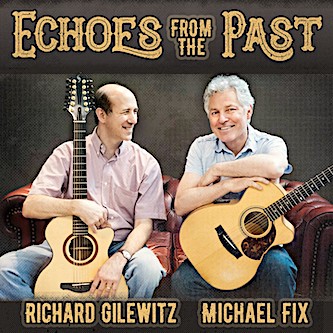 For the better part of the past three decades, Chicago-based Richard Gilewitz has remained one of the top 6 & 12 string acoustic guitarists on the worldwide music scene. Richard has a number of acclaimed instrumental album releases in his catalog and the trend continues with the 2022 album release of Echoes From The Past. Recorded with Australian guitar ace Michael Fix, the eleven track album was released so far as a digital only album in June 2022 which breaks the trend of Richard’s CD releases starting with his 1997 album Synapse Collapse. Available on most of the major music download websites worldwide, Echoes Of The Past is somewhat of a best of Richard Gilewitz with its assortment of vintage pieces, all newly recorded with Australian guitarist Michael Fix.
For the better part of the past three decades, Chicago-based Richard Gilewitz has remained one of the top 6 & 12 string acoustic guitarists on the worldwide music scene. Richard has a number of acclaimed instrumental album releases in his catalog and the trend continues with the 2022 album release of Echoes From The Past. Recorded with Australian guitar ace Michael Fix, the eleven track album was released so far as a digital only album in June 2022 which breaks the trend of Richard’s CD releases starting with his 1997 album Synapse Collapse. Available on most of the major music download websites worldwide, Echoes Of The Past is somewhat of a best of Richard Gilewitz with its assortment of vintage pieces, all newly recorded with Australian guitarist Michael Fix. True to form, Gilewitz and Fix work music magic on their cover of the Beatles’ 1964 classic “If I Fell”, changing a few key notes while honoring the original with both verve and reverence. A new version of the Harold Arlen classic “Over The Rainbow” proves once again just how timeless this evergreen song classic still is. The title track “Echoes From The Past” is an original written by Michael Fix and is surely one of the highlights on the album that shares the song title's name. Echoes Of The Past closes with a fresh version of Richard’s 1994 album title track “Synapse Collapse”. Although originally written and recorded 28 years ago, the song maintains its stylish feeling.
True to form, Gilewitz and Fix work music magic on their cover of the Beatles’ 1964 classic “If I Fell”, changing a few key notes while honoring the original with both verve and reverence. A new version of the Harold Arlen classic “Over The Rainbow” proves once again just how timeless this evergreen song classic still is. The title track “Echoes From The Past” is an original written by Michael Fix and is surely one of the highlights on the album that shares the song title's name. Echoes Of The Past closes with a fresh version of Richard’s 1994 album title track “Synapse Collapse”. Although originally written and recorded 28 years ago, the song maintains its stylish feeling.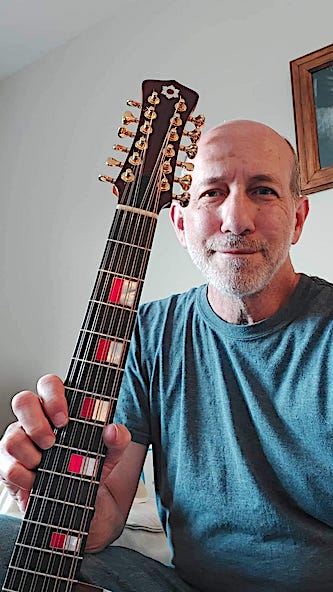 mwe3: Why did you call your new album Echoes From The Past? You say it combines some of your classics from the past. Are the tracks all redone by you and Michael and recorded in Australia?
mwe3: Why did you call your new album Echoes From The Past? You say it combines some of your classics from the past. Are the tracks all redone by you and Michael and recorded in Australia?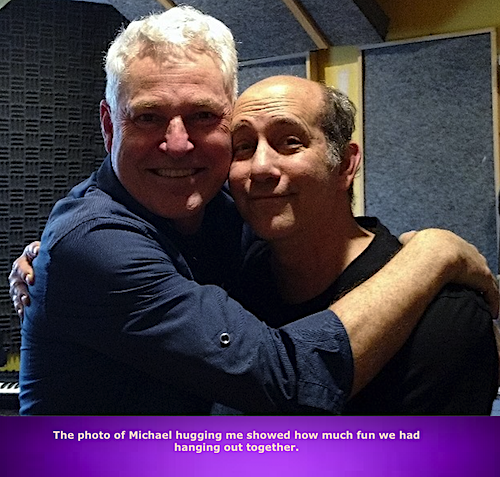 mwe3: Michael compares your guitar playing to Leo Kottke yet he says his guitar sound is not influenced by Leo. How would you describe the guitar chemistry between you and Michael and how did you share the various guitar parts on the Echoes From The Past tracks.
mwe3: Michael compares your guitar playing to Leo Kottke yet he says his guitar sound is not influenced by Leo. How would you describe the guitar chemistry between you and Michael and how did you share the various guitar parts on the Echoes From The Past tracks.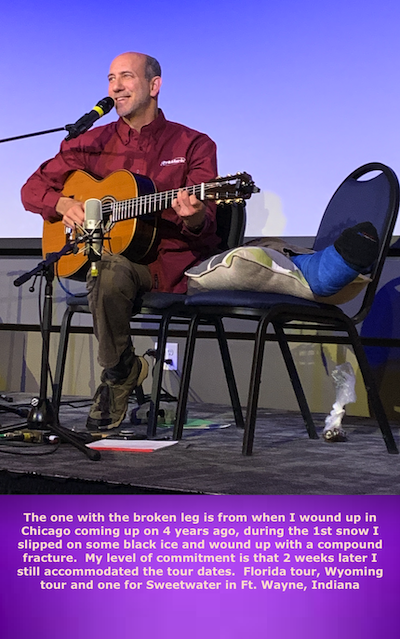 Richard Gilewitz: I actually wrote the entire tune in college at The University of Alabama around 1980. The first time I recorded it was on an LP entitled Somewhere In Between. I recorded it once again on Synapse Collapse since it fit the theme of the CD and I felt like I was playing it more to form at the time.
Richard Gilewitz: I actually wrote the entire tune in college at The University of Alabama around 1980. The first time I recorded it was on an LP entitled Somewhere In Between. I recorded it once again on Synapse Collapse since it fit the theme of the CD and I felt like I was playing it more to form at the time.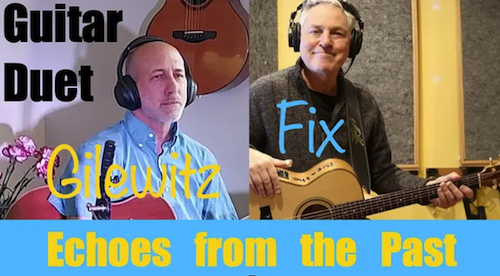 mwe3: You’ve been a Beatles fan since forever and “If I Fell” is simply one of their most lush songs of all time. You do change a few notes yet it retains the magic of the original? How did you and Michael split up the guitar parts? There’s some fast leads too on your version.
mwe3: You’ve been a Beatles fan since forever and “If I Fell” is simply one of their most lush songs of all time. You do change a few notes yet it retains the magic of the original? How did you and Michael split up the guitar parts? There’s some fast leads too on your version. mwe3: Is “Minuet For The Backroads” another classic brought back to life on Echoes From The Past? When was it written and rerecorded with Michael Fix? Is it classical based?
mwe3: Is “Minuet For The Backroads” another classic brought back to life on Echoes From The Past? When was it written and rerecorded with Michael Fix? Is it classical based?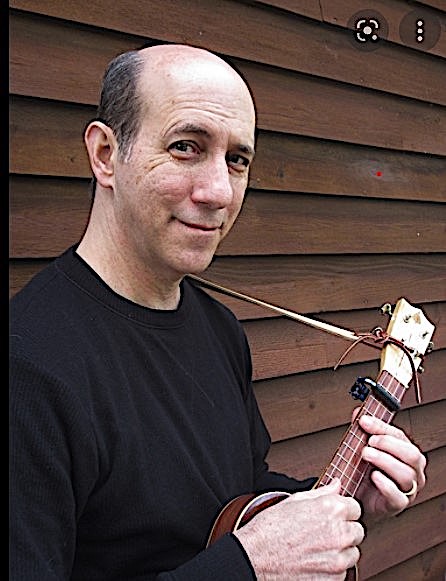 In the recovery room he was concerned that he did not have a robot name because he felt that if he died and went to robot heaven without a proper robot name he would be picked on and bullied by the other robots. So he came up with “Mr. Sputnik”, requesting and actually demanding that all of the doctors refer to him as “Mr. Sputnik” in the future. It was actually put into his charts.
In the recovery room he was concerned that he did not have a robot name because he felt that if he died and went to robot heaven without a proper robot name he would be picked on and bullied by the other robots. So he came up with “Mr. Sputnik”, requesting and actually demanding that all of the doctors refer to him as “Mr. Sputnik” in the future. It was actually put into his charts.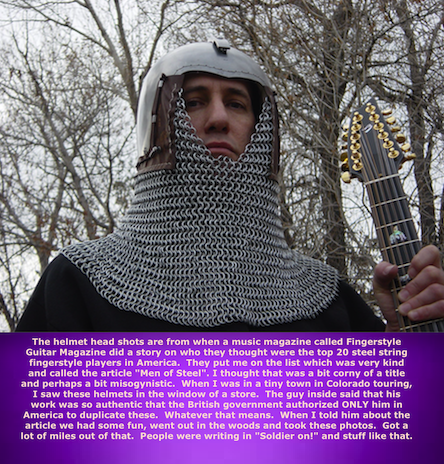 Richard Gilewitz: Yes, this is one of Fernando Sor’s pieces. Actually a very simple tune and one of his introductory pieces for students. I think it is probably the first one that I studied with David Walbert while attending The University of Alabama. Dave only played on a nylon string and I adapted it to the steel string.
Richard Gilewitz: Yes, this is one of Fernando Sor’s pieces. Actually a very simple tune and one of his introductory pieces for students. I think it is probably the first one that I studied with David Walbert while attending The University of Alabama. Dave only played on a nylon string and I adapted it to the steel string.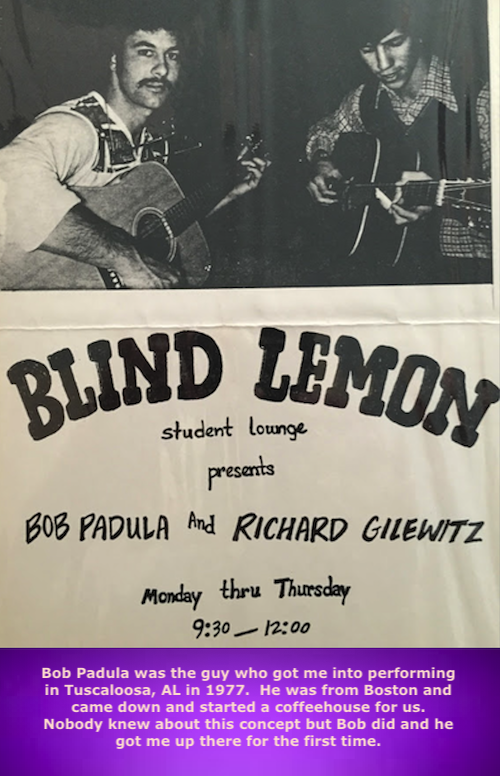 mwe3: Now that you’ve moved from Florida, you’re living in the Chicago area these days. How would you compare living there compared to Florida? You were born in Florida? I guess you don’t have to worry that much about hurricanes as you do from the Chicago area winters.
mwe3: Now that you’ve moved from Florida, you’re living in the Chicago area these days. How would you compare living there compared to Florida? You were born in Florida? I guess you don’t have to worry that much about hurricanes as you do from the Chicago area winters. Richard Gilewitz: I use the classical technique of utilizing my picking fingers with P,I, M and A or thumb, index, middle and ring. After trying fingerpicks for a while, which Leo Kottke referred to as my Freddy Krueger Starter Set, I adapted to just bare fingers. I was breaking nails all the time while touring so I generally play with very short nails.
Richard Gilewitz: I use the classical technique of utilizing my picking fingers with P,I, M and A or thumb, index, middle and ring. After trying fingerpicks for a while, which Leo Kottke referred to as my Freddy Krueger Starter Set, I adapted to just bare fingers. I was breaking nails all the time while touring so I generally play with very short nails.